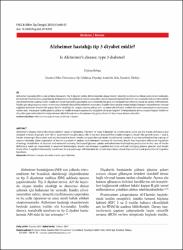| dc.contributor.author | Erbaş, Oytun | |
| dc.date.accessioned | 2015-07-29T12:14:55Z | |
| dc.date.available | 2015-07-29T12:14:55Z | |
| dc.date.issued | 2015 | |
| dc.identifier.citation | Erbas O. Alzheimer hastalığı tip 3 diyabet midir?. FNG & Bilim Tıp Dergisi. 2015; 1(1): 48-51. doi: 10.5606/fng.btd.2015.010 | en_US |
| dc.identifier.issn | 2149-4401 | |
| dc.identifier.uri | https://hdl.handle.net/11446/727 | en_US |
| dc.description.abstract | Alzheimer hastalığı (AH) en sık görülen demanstır. Tip 3 diyabet terimi, AH’de beyinde oluşan insülin eksikliği ve direncine dikkat çekmek için kullanılan bir terimdir. Postmortem çalışmalarda AH hastalarının beyinlerinde insülin reseptörü, insülin benzeri büyüme faktörü 1 ve 2 ve insülin haberci ribonükleik asit düzeylerinde azalma vardır. İnsülin kan beyin bariyerine geçmekte ayrıca beyinde bir grup nöron tarafından internal olarak da sentez edilmektedir. İnsülin gen ekspresyonu matur ve immatur memeli nöronal hücrelerinde mevcuttur. İnsülin nöronlardaki enerji metabolizmasını düzenlemesi nöronal sağkalım üzerinde önemli etki yapar. İnsülin eksikliğinde oluşan azalmış glikoz alımı ve adenozin trifosfat üretimi nöronal homeostazın bozulmasına neden olur. Intranazal insülin plazma glikoz ve insülin konsantrasyonunda değişiklik olmadan kognitif fonksiyonlarda artma oluşturmuştur. İnsülin ve alt yolları gelecekte bellek fonksiyonlarının düzeltilmesinde ve korunmasında güncel önemini korumaya devam edecektir. | en_US |
| dc.description.abstract | Alzheimer's Disease (AD) is the most common cause of dementia. The term of 'type 3 diabetes' is constituted to point out the insulin deficiency and resistant in brain of people with AD. In postmortem studies about AD, it has ben detected that insulin receptors, insulin-like growth factor 1 and 2, insulin messenger ribonucleic acid are decreased in brain. Insulin can pass through brain-blood-barrier, besides it can be synthesized by a group of neuron internally. Gene expression of insulin is present in mature and immature neurons of mammals. Insulin has important effects on regulation of energy metabolism of neurons and neuronal recovery. Decreased glucose uptake and adenosine triphosphate production in the case of insülin deficiency, leads an impairment in neuronal homeostasis. Insulin can increase cognitive functions without changing plasma glucose and insülin levels when it applied intranasally. Insulin and its sub-pathways will maintain its current importance about improvement and protection of cognitive functions. | en_US |
| dc.language.iso | tur | en_US |
| dc.publisher | İstanbul Bilim Üniversitesi, Tıp Fakültesi | en_US |
| dc.identifier.doi | 10.5606/fng.btd.2015.010 | en_US |
| dc.rights | info:eu-repo/semantics/openAccess | en_US |
| dc.subject | alzheimer hastalığı | en_US |
| dc.subject | demans | en_US |
| dc.subject | insülin | en_US |
| dc.subject | tip 3 diyabet | en_US |
| dc.subject | alzheimer's disease | en_US |
| dc.subject | dementia | en_US |
| dc.subject | insulin | en_US |
| dc.subject | type 3 diabetes | en_US |
| dc.title | Alzheimer hastalığı tip 3 diyabet midir? | en_US |
| dc.title.alternative | Is Alzheimerʹs disease, type 3 diabetes? | en_US |
| dc.type | article | en_US |
| dc.relation.journal | İstanbul Bilim Üniversitesi Florence Nightingale Tıp Dergisi | en_US |
| dc.department | DBÜ | en_US |
| dc.identifier.issue | 1 | |
| dc.identifier.volume | 1 | |
| dc.identifier.startpage | 48 | |
| dc.identifier.endpage | 51 | |
| dc.contributor.authorID | TR44788 | en_US |
| dc.relation.publicationcategory | Belirsiz | en_US |


















